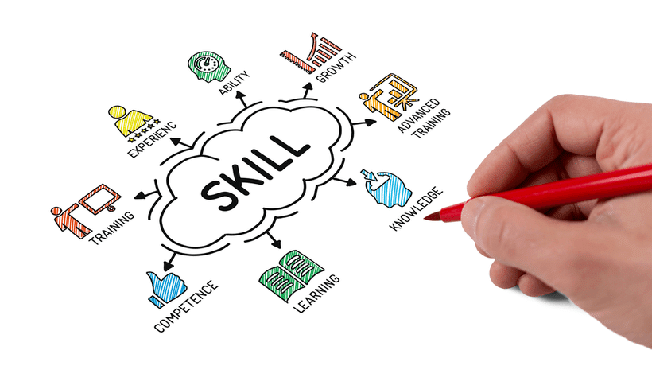By Anna Mylona
In the wake of the pandemic and the relentless march of technology, businesses worldwide have experienced a significant transformation in the realm of work. As this new landscape evolves, organizations are beginning to acknowledge that skills have become the currency of the future, driving employability and success. To adapt to the rapidly changing skill demands, businesses must be vigilant in seeking new talent, while also prioritizing the reskilling and upskilling of their current workforce.
So, why are reskilling and upskilling so essential for the future of business and what actions can organizations take to ensure their own sustainability, as well as that of their employees?
Acknowledging the Importance of Skills
To thrive in the future, businesses must be able to identify the skills that are critical for their organization today, and the future. Creating a culture where conversations about training and development are commonplace is crucial. Reskilling and upskilling should not be confined to HR practices alone. Instead, they need to infuse the entire organization and become an integral part of the daily workflow. Mercer’s Global Talent Trends research report highlights how important it is for employees to work for relatable organizations that prioritize collaboration with management, support employee well-being, encourage reskilling and upskilling, and foster a culture of growth and development.
Fostering Employee Growth and Development
In the modern workforce, employees seek ownership of their careers and the opportunity for continuous growth. Employability no longer means staying in the same job with the same company throughout one’s entire career. Rather, it entails acquiring the ability to pursue diverse job opportunities and careers within a single organization. By investing in their employees’ development, businesses can retain valuable talent and provide avenues for personal and professional growth. With the availability of data-driven insights, employees can identify the skills required for future roles and pursue targeted development accordingly.
Identifying Skill Gaps
As the market becomes more demanding in all disciplines, an increasing number of employees are actively seeking to learn new skills, while HR practitioners acknowledge significant skill gaps within their organizations. This highlights the urgent need for businesses to bridge these gaps through ongoing training and development initiatives. Prioritizing employee well-being and growth has become a top concern for organizations, especially in the new business era we are experiencing. By nurturing their existing talent, organizations can enhance their competitive advantage, particularly in the face of remote work and digital transformation.
Investing in Current Teams
Instead of rushing into extensive recruitment drives, businesses might initially consider evaluating the potential of their current teams. The pandemic, the surge in inflation rates, and other recent challenges that businesses have experienced should have proved the resilience and loyalty of employees who weathered the storm alongside their organization. Rather than focusing solely on new hires, investing in the development and upskilling of current employees who have proven their dedication, can yield significant returns. This approach not only strengthens the organization but also ensures continuity and a sense of control over what lies ahead.
Embracing a Talent-Driven Approach
Reskilling and upskilling initiatives should no longer be considered as one-time endeavours. Given the rapid pace of change in the corporate space, continuous reinvention of skills is essential throughout someone’s career. It is fundamentally important for leaders in organizations to embrace this mindset, engage in conversations with employees, and articulate the skills required to succeed in the global market. By fostering a talent-driven approach, organizations can empower individuals to take control of their career paths and seize opportunities for personal and professional growth.
Steering through Transformation
Embarking on the journey of upskilling and reskilling may seem overwhelming to organizations. However, breaking the process down into manageable steps can be more effective and have a significant impact. This may include identifying critical areas experiencing talent shortages or implementing and testing new initiatives or programs on a small scale before rolling them out more broadly.
By involving all areas of the business, organizations can collectively define talent processes, assess the current status quo, determine the desired future state, and strategize on closing the skills gap. This collaborative effort between HR and management teams is essential for aligning priorities and setting a clear path forward.
Driving Self-Progression
Organisations need to establish the foundation and provide the tools necessary for individuals to carve out their own opportunities, as well as cultivate a corporate culture that promotes responsibility and autonomy. This effort, however, is not a one-way street. Career progression is ultimately a personal choice, and each individual should attempt to design their unique career path, fuelled by self-motivation and discipline to stay the course.
As we navigate this rapidly evolving, fiercely competitive business environment, it becomes imperative for individuals to reflect upon their personal evolution and development. The twin engines of upskilling and reskilling form an integral part of this journey of growth. They empower individuals to respond effectively to ceaseless changes and ensure their sustained competitiveness and relevance in their field of work. It falls upon each person to seize opportunities for skill refinement and leverage them to strengthen personal competencies.
Conclusively, in a rapidly evolving business landscape, reskilling and upskilling have become imperative for organizations striving to thrive in the future. By recognizing the importance of skills, empowering employees, addressing skill gaps, investing in current teams, and embracing a talent-driven approach, businesses can position themselves for sustained success. The journey of reskilling and upskilling is a continuous one, requiring a proactive mindset from leadership teams and an individual commitment to continuous learning, development, and growth. By embracing reskilling and upskilling, businesses and individuals can seize the opportunities presented by the dynamic world of work and secure a competitive advantage in the global market.
Anna Mylona is Head of Human Capital at Elias Neocleous & Co LLC







Click here to change your cookie preferences